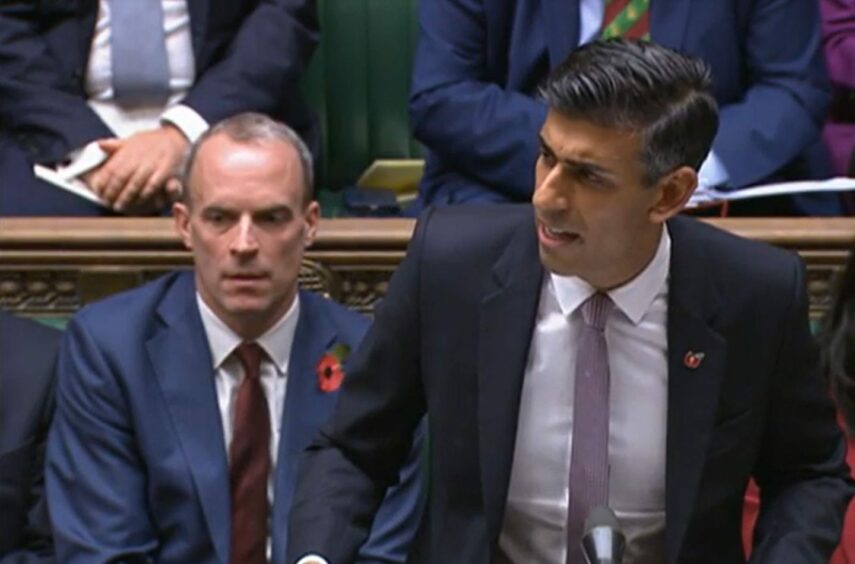
Rishi Sunak has come under fire over a windfall tax on oil and gas firms enacted during his time as Chancellor, as Shell confirms it made no additional payments thanks to generous investment rebates.
Labour leader Keir Starmer challenged the Prime Minister over the resignation of cabinet minister Sir Gavin Williamson amid allegations of bullying, and likened his “weak” stance to that of the government’s tax incentives for oil and gas multinationals.
“If he can’t stand up to a run of the mill bully, he has no chance of standing up to vested interests on behalf of working people,” Mr Starmer said during PMQs.
“Take Shell, they made record profits this year of £26bn – how much have they paid under his so-called windfall tax?
“The answer is nothing. Shell haven’t paid a penny in windfall tax. Why? Because for every pound they spend digging up fossil fuels he hands them a 90p tax break and it’s costing the taxpayer billions.
“So will he find a backbone and end his absurd oil and gas giveaway?”
Enacted in May, the Energy Profits Levy (EPL) adds a 25% surcharge on oil and gas profits, increasing the effective rate of tax paid by offshore energy firms to 65%. However, it also comes with investment allowances which allow North Sea producers to claim a 91p tax saving for every £1 they invest in further oil and gas extraction.
In reply, Mr Sunak noted that he had introduced the windfall tax, adding that it was “businesses investing that create jobs in this country.”
“We on this side of the House understand that. We will support businesses to invest, to create jobs, because that’s how we create prosperity, that’s how we support strong public services.”
EPL extension
Mr Starmer rounded off by saying the Prime Minister would be “too weak to end his oil and gas giveaway” in next Thursday’s budget announcement.
However, a further spate of eye-watering quarterly results from energy firms has politicians and campaigners eyeing further tax-raising measures as the government looks to plug a hole of up to £60bn in public finances.
Chancellor Jeremy Hunt and the Prime Minister are thought to be mulling an increase in the EPL rate and a timeline extension ahead of the Budget. If implemented, it could see North Sea operators paying a headline rate of 70% through to 2028, though the fate of the investment allowances is not known.
Other measures are rumoured to include cost and revenue caps on renewable generators.
Shell windfall tax
London-headquartered Shell paid no windfall last quarter, despite returning quarterly pre-tax profits of $11.4bn, while profits in 2022 to date totalled more than $48bn.
The group allotted tax charges of $361m during the quarter, though later clarified it was not liable for additional North Sea windfall tax payments owing to its investment in the basin.
“Heavy capex has meant we haven’t had extra tax coming through,” chief financial officer Sinead Gorman told journalists during a media briefing on the company’s results.
Gorman further explained: “In the UK side of things, we’ve been heavily investing over the last couple of months, in effect getting making sure we get Pierce up and running.
However, outgoing chief executive Ben van Beurden said the supermajor did expect to make payments in Q1 2023.
Meanwhile, rival BP reported third quarter earnings of nearly $8.2bn (£7.1bn) during Q3, and confirmed it would pay around $2.5bn taxes on its North Sea business for full-year 2022.
Of this it said around $800m (£693m) is expected to come directly via the EPL.
Recommended for you
